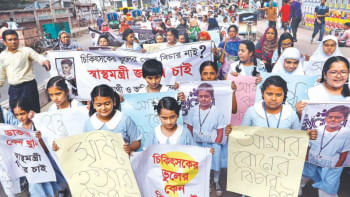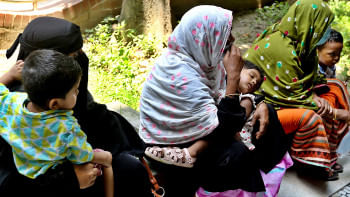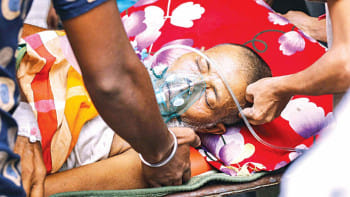Victims of a rotten healthcare system

The tragic death of an expectant mother and her newborn baby at a hospital in Dhaka due to medical negligence has yet again brought to the fore the ills that seem to have gripped our entire healthcare system. Reportedly, Mahbuba Akter Akhi, a 25-year-old pregnant woman, got admitted to the Central Hospital on June 9 with the hope of having a normal delivery. However, she ended up going through a botched C-section, following which both the baby and the mother died – while the baby passed away a day after the surgery, the mother lost her life eight days later.
Reportedly, Akhi was being advised by gynaecologist Dr Sangjukta Saha of the hospital for the past three months. On the night of June 9, she came to Dhaka from Cumilla with her husband Yakub Ali and was admitted to the hospital under Dr Saha. However, when the couple looked for Dr Saha, the hospital authorities lied to them about her absence. She was not there in the labour room where Akhi was trying to have a normal delivery. Instead, there were other doctors and staff trying to assist her throughout the process. As things got complicated (we still do not know what exactly went wrong), they conducted a C-section surgery, following which the tragedy happened.
The heart-wrenching incident has been in discussion in the media and social circles for quite some time now. While people are still debating as to who actually is responsible for the deaths of Akhi and her newborn – her supervising doctor or the hospital authorities – I would like to focus on a different aspect of the incident that has been missing in this discussion. Why could Akhi not have a normal delivery, which she wanted? There are many questions crowding my mind: what complications did Akhi have while trying for a natural birth that the doctors had to go for a C-section? Did the doctors and nurses present there have the necessary knowledge and training to assist a natural birth? Did the hospital appoint any trained midwife to assist Akhi? What was the reason for Akhi's excessive bleeding after childbirth? Did Akhi die from the C-section surgery or the flawed normal delivery attempt? Asking these questions is crucial to understanding why such a tragedy happened at a renowned hospital.
There are many questions crowding my mind: what complications did Akhi have while trying for a natural birth that the doctors had to go for a C-section? Did the doctors and nurses present there have the necessary knowledge and training to assist a natural birth? Did the hospital appoint any trained midwife to assist Akhi? What was the reason for Akhi's excessive bleeding after childbirth? Did Akhi die from the C-section surgery or the flawed normal delivery attempt?
One of my relatives was recently admitted to a reputed private hospital in Dhaka with the hopes of having a normal delivery, but ended up having a C-section surgery. She shared with me her traumatising experience in the labour room, where nothing seemed to go as per her plan. Although she wanted to wait for her labour to start on its own, the nurses present there hurriedly gave her pain medication through an IV to induce labour. This was despite the fact that she wasn't past her due date and both she and the baby were in good condition. While the doctors could have explained why they did what they did, the sad fact is that she had a feeling that not everything was going the right way. She eventually had to go through a C-section while in labour.
Unfortunately, this is not an isolated incident. Ask any woman who went to have a natural birth at any private hospital in the capital, and she will tell you about her terrifying experience in the labour room and the constant pressure from the attending nurses and staff to opt for a C-section instead. Talking to a few new mothers recently, I came to know that doctors and nurses in the labour rooms do not provide any suggestions for pain relief during labour – which is an integral part of the natural birth process in developed countries. They hardly care about the mental well-being of the expectant mothers. Use of birthing chairs, birthing balls or any other tools to assist the expectant mothers is absent here. When my relative asked her gynaecologist whether she needed to do any kind of physical exercise prior to her delivery since she wanted a natural birth, the doctor showed no interest in the conversation.
Why is the system in our reputed private hospitals so inefficient when it comes to performing normal deliveries? Why can't they create a system maintaining the international standards? What I understand with my limited knowledge about the issue is that there could be two reasons. First, our private hospitals are profit-oriented and do not want to invest so much time into natural births when C-sections take much less time and bring more profit. Currently, 84 percent of C-sections performed in the country are done in private healthcare facilities. The second reason is the absence of professional midwives in these hospitals who have the skills to conduct normal deliveries.
Unfortunately, while normal deliveries are always conducted by professional midwives in other countries, in Bangladesh, patients are dependent on their gynaecologists and obstetricians, who mostly perform C-section surgeries. It is not at all surprising because doctors are not supposed to conduct normal deliveries; they should only come forward when anything goes wrong with the natural birth process. However, there are a few doctors in our private hospitals who encourage their patients to go for normal deliveries. But the question is, do they have trained midwives in the hospitals to assist such deliveries? If not, why? If there were trained midwives in the labour room of Central Hospital, the doctors might not have to go for a C-section operation, and Akhi and her newborn baby's lives might have been saved.
The question that further bothers me is, if normal deliveries can be conducted regularly in our upazila health complexes, why can't that happen in our private hospitals? Why can't all our hospitals have a team of skilled midwives to conduct such deliveries? Akhi and her newborn's deaths have exposed the misguided approach that our private hospitals have taken regarding childbirth, normal deliveries, and C-sections. The time has come now to question these malpractices and demand the much-needed reforms in our healthcare system.
Since Akhi's husband filed a case immediately after his baby's death, we saw some action being taken by police. Our health authorities also took some measures, such as shutting down the operation theatre and intensive care unit of the hospital, directing Akhi's supervising doctor to refrain from providing service at that hospital until further notice, etc. But given the severity of the incident, these steps are not enough. The DGHS must dig deep into the incident and find out the real reasons behind what happened, following which the state should take legal actions against those responsible. The Bangladesh Medical and Dental Council should also play its part now that Akhi's husband has filed a complaint with it, accusing the authorities of Central Hospital and Dr Sangjukta Saha and seeking justice for the deaths of his wife and newborn. Only by holding those responsible to account can such crimes of medical negligence be prevented.
Naznin Tithi is a member of the editorial team at The Daily Star.

 For all latest news, follow The Daily Star's Google News channel.
For all latest news, follow The Daily Star's Google News channel. 











Comments